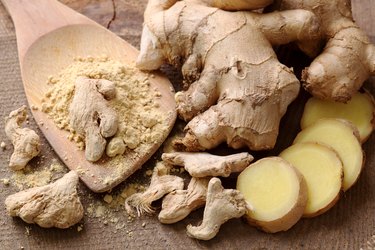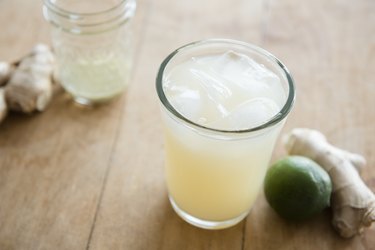
Everyone experiences gas and bloating at one time or another. But for some, the issue may be frequent, adding up to a lot of time in discomfort.
"Gas and bloating often occur because of sluggishness of the GI tract," says Arielle Levitan MD, co-founder of Vous Vitamin and author of The Vitamin Solution:Two Doctors Clear the Confusion About Vitamins and Your Health. This can happen for a variety of reasons, she notes, including nutrient or fiber shortfalls and lack of hydration.
Video of the Day
Video of the Day
Frequent bloating can also be due to a food intolerance, digestive disorders or conditions such as small intestinal bacterial overgrowth (SIBO), per the Cleveland Clinic. "However, many people have these symptoms as a part of daily life with easily remediable causes," Dr. Levitan says.
If you're looking to ease bloating, consider your diet. What you eat can play a role, and while some vitamins and supplements can leave you bloated, others can help diminish this symptom. Take a look at foods, supplements and vitamins for bloating.
1. Probiotics
Getting more probiotics (aka good-for-your-gut bacteria) can help with gas and bloating. Here's why: "They help change the intestinal microflora — that is they introduce different bacteria into your system that are important for optimal digestion," Dr. Levitan says.
But be choosy when it comes to the probiotic strains you seek out to ease gas and bloating symptoms, says Ella Davar, RD, CDN. "These three strains are specifically designed to ease bloating, aid digestion and elevate your gut microbiome," Davar says.
- Bifidobacterium lactis Bi-07: This strain "is clinically shown to help ease bloating, promote abdominal comfort and support healthy immune function," Davar says.
- Bifidobacterium lactis HN019: This strain will support digestion, help you get more regular and cut down on gas, Davar says.
- Lactobacillus acidophilus NCFM: This strain of probiotics delivers a trio of benefits. It's "clinically shown to help with bloating, promote abdominal comfort and support a healthy frequency of bowel movements," Davar says.
There are plenty of foods with probiotics you can add to your diet, such as yogurt, kimchi and sauerkraut, or you can consider a supplement.
Try These Probiotics
- Culturelle Digestive Health Daily Probiotic Capsules ($17.17, Walmart)
- Kyo-Dophilus Max Probiotics ($28.14, Amazon)
- Visbiome High Potency Probiotics ($72, Amazon)
What About Prebiotics?
Along with probiotics, it can help to make sure you’re getting plenty of prebiotics. “Prebiotics are the various types of fiber which feed the probiotic strains. This allows the bacteria to thrive in our intestinal tract,” says Kimberly Gomer RD, LDN, director of nutrition at Body Beautiful Miami.
There are plenty of commonplace prebiotic foods, such as bananas, whole grains and alliums (aka garlic and onions), that you’re likely already eating.
“Eating fibrous vegetables, complex carbohydrates, fermented food, along with taking a probiotic supplement can lend support to digestion,” Gomer says.
2. Fiber
On the one hand, adding fiber to your diet — particularly if you do so rapidly — can lead to gas and bloating, per the Mayo Clinic. On the other hand, getting enough fiber helps prevent gas and bloating, according to the Cleveland Clinic.
"Extra fiber intake has been shown as an effective way to help with bloating related to constipation," says Thomas Gut, DO, associate chair of medicine at Staten Island University Hospital.
You can slowly add more high-fiber foods to your diet. Or, consider supplementing, particularly if you experience constipation.
Try These Fiber Supplements
- Garden of Life Super Seed Whole Food Fiber Supplement ($20.99, Amazon)
- Thorne FiberMend ($40, Amazon)
3. Magnesium
Another tool in the toolbox of supplements for gas and bloating: magnesium. This nutrient is found naturally in many foods, such as whole grains and leafy grains, as well as in some fortified foods, per the Office of Dietary Supplements (ODS).
"Magnesium can be particularly helpful for these symptoms because it helps stimulate the muscles in your intestines to work properly," Dr. Levitan says.
If you're not getting enough foods high in magnesium, you may opt to take a supplement. The recommended daily amount of magnesium is between 310 and 420 milligrams per day, according to the ODS, and most people in the United States get less than this recommendation.
Try These Magnesium Supplements
- Nature Made Magnesium 250 mg Liquid Softgel ($9.99, Amazon)
- Thorne Magnesium Bisglycinate ($48, Amazon)
4. Vitamin D
Vitamin D — aka the sunshine vitamin — is important for your health in a wide variety of ways, including regulating cellular function and supporting your bones, per the Mayo Clinic. And, it can also play a role in your gut health, with a shortage of vitamin D potentially causing bloating and gas.
"Vitamin D helps affect the GI tract, but we are not exactly certain how or why," Dr. Levitan says. "Likely its role as hormone also influences the smooth functioning of the intestines."
You can get vitamin D through sun exposure and also by eating foods high in vitamin D (or foods that are fortified with it).
The recommended daily allowance for this vitamin is 15 micrograms or 600 international units, per the ODS. But most people in the U.S. don't get enough of this vitamin, according to the ODS, which is why supplementation may be helpful. (Talk to your doctor before supplementing with vitamin D; blood tests can reveal your vitamin D levels.)
Try These Vitamin D Supplements
- Nature Made Vitamin D3 ($11.91, Amazon)
- MegaFood Vitamin D3 ($20.99, MegaFood)
- Nordic Naturals Vitamin D3 (from $15.26, Amazon)
5. Mint
Mint may feel like a homespun remedy for digestive issues, but it's genuinely helpful.
"Mint leaves are anti-inflammatory and may help reduce inflammation in the stomach and relieve indigestion (which can cause upper abdominal bloating)," Gomer says. Having peppermint, for instance, helps relax digestive muscles so gas can travel out, per Mount Sinai.
You can try taking peppermint oil. Or, brew up some mint tea. "All varieties of mint leaves may be used fresh [or] in dried herb form, brewed as a tea," Gomer says.
Try These Mint Options
- Twinings Pure Peppermint Tea ($8.61 for 120 teabags, Amazon)
- NOW Foods, Peppermint Gels ($10.34 for 90 softgels, iHerb)
Related Reading
6. Ginger
Ginger does more than add a kick to food — it can help with digestion. "Ginger is believed to speed up the movement of food through the GI tract, while also protecting the gut," Gomer says. "It may also ease bloating, cramps and gas," she says.
Having ginger can reduce constipation and other factors that lead to bloating and gas, per Johns Hopkins.
There are few ways to try it: You can boil fresh ginger or add ground ginger to hot water and have it like a tea, Gomer suggests. "If bloating comes after eating, drinking ginger tea may help," she says.
Before You Buy Supplements
The supplementsaisle is often described as the wild west, due to the lack of oversight and regulation on manufacturer claims. Here's how to be a wise consumer:
Seek Out Reputable Brands, and Look for Third-Party Testing
Look for reputable supplement brands, Dr. Levitan recommends.
"These products are not FDA-approved so there can be great danger in taking poorly made products (they can be contaminated and contain unsafe ingredients). Looking for USP or GMP certification is a good way to ensure a level of quality," Dr. Levitan says.
Related Reading
Consider Dosage and Drug Interactions
Supplements are available over the counter, which can make it feel like no big deal to add one (or several) to your routine. But you want to make sure you're taking the right dose for your needs, Dr. Levitan says. "You may not need the same dose of certain nutrients as your friends and neighbors," she says.
Plus, supplements can potentially interact with other over-the-counter or prescribed medications.
It's always wise to consult your doctor, a dietitian or another health care provider before starting to take supplements.
More Tips to Ease Bloating
Supplements aren't the only way to ease gas and bloating. In fact, sometimes supplements "can cause stomach distress," Gomer says. She often recommends patients hit pause on supplements for several weeks if they have bloating or other digestive issues.
When it comes to minor bloating, there are many options, Dr. Gut says. "The effectiveness of most of these options will vary based on the individual's underlying reason for bloating," he adds. Some tactics to try:
- Watch your stress levels. Your stress can potentially affect your digestion, Gomer says. (Just think about how people get "butterflies in their stomach.") If you think stress is contributing to digestive problems, try stress-relief strategies such as gentle exercise and meditation, Gomer says.
- Watch what you eat, too. Aim to get probiotic-rich foods daily, Davar says. And keep in mind that processed foods, dairy and gluten can lead to constipation in some people, Gomer says. Sometimes eliminating certain food groups — like dairy — or following the low-FODMAP diet can help determine the trigger for symptoms, Dr. Levitan says.
- Drink plenty of water. Doing so can help ease constipation, Gomer says.
- Get regular exercise. "The worst thing for constipation is inactivity," Gomer says. (Try these physical activities that can help reduce bloating.)
- Try over-the-counter remedies. "The last option to consider before speaking to a doctor could be an over-the-counter medicine that contains simethicone," Dr. Gut says.
When to See a Doctor
An occasional bout of gas and bloating is nothing to be concerned about, and will generally pass quickly enough. But persistent issues are an indicator you should reach out to a health care provider who can dig into what's going on.
Other reasons to visit a doctor include unexplained weight loss, severe pain, nausea and vomiting or blood in your stool, Dr. Levitan says. Plus, tell your doctor "if you need to use something routinely or consistently to relieve gas or bloating," Dr. Gut says.
"When the discomfort of gas and bloating is getting in the way of your daily life then it is time to solve the issue," Gomer says.
- Mayo Clinic: "Dietary fiber: Essential for a healthy diet"
- Cleveland Clinic: "Bloated Stomach"
- Office of Dietary Supplements: "Magnesium"
- Mayo Clinic: "Vitamin D"
- ODS: "Vitamin D"
- Mount Sinai: "Peppermint"
- Johns Hopkins Medicine: "Ginger Benefits"
- Evidence-Based Complementary and Alternative Medicine: "Bitters: Time for a New Paradigm"
- Cleveland Clinic: "What To Know Before You Try Digestive Bitters"
Was this article helpful?
150 Characters Max
0/150
Thank you for sharing!
Thank you for your feedback!
Is this an emergency? If you are experiencing serious medical symptoms, please see the National Library of Medicine’s list of signs you need emergency medical attention or call 911.





